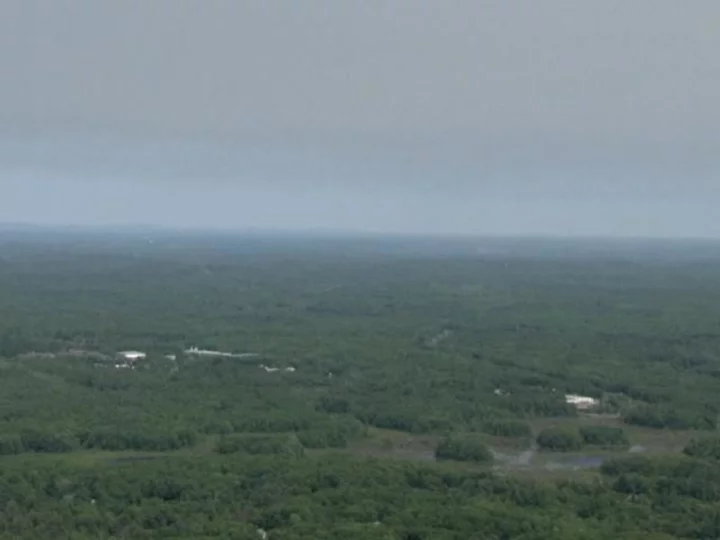Smoke from raging wildfires in Nova Scotia that has forced nearly 18,500 people to evacuate is spreading from Canada to the United States and impacting cities across the northeast on Tuesday, weather officials said.
The fires, which are continuing as the Canadian region experiences record-breaking heat, span more than 25,000 acres and have destroyed multiple buildings and caused huge plumes of smoke to tower over the region. Officials announced a provincewide burn ban Monday due to the "seriousness of the current fires."
The smoke is making its way over Cape Cod and will spread along parts of New England as winds shift to the southeast, according to the National Weather Service in Boston.
"Those with a sensitive nose may be able to smell the smoke as it pushes through the region," the agency said.
A fire burning in Halifax, the provincial capital of Nova Scotia, is "not yet under control" and has forced around 16,492 people to evacuate, according to Halifax Regional Municipality officials.
Authorities said about 2,000 people have been evacuated from Shelburne County in southwest Nova Scotia.
All schools in Shelburne County and at least 14 schools in Halifax will be closed Wedesday, officials announced in an update Tuesday evening, as wildfires remain out of control.
Residents are still advised to avoid the evacuation areas as at least 200 structures suffered damage from the fires, Halifax Regional Fire and Emergency Deputy Chief Dave Meldrum said on Tuesday, adding that the fires have not yet been contained.
"Please don't return to the evacuated area. It's still a dangerous place. It's not ready for you yet," Meldrum added.
"I am praying for any type of precipitation at this point, and I know everybody up here shares in that thought," David Steeves with the Nova Scotia Department of Natural Resources and Renewables said in a press conference on Tuesday.
Steeves said the possibility of wildfires spreading more quickly is increasing every day. There is no rainfall expected in the coming days for the area, according to CNN meteorologists, but as of Tuesday evening, the forecast called for a chance of rain at the end of the week.
"Weather is not helping us at all in regard to this," Steeves said.
Near Philadelphia, the air quality was considered "moderate" as of Tuesday morning, according to a recent tweet from the National Weather Service. But it's still uncertain whether the wildfire smoke will reach the ground before dissipating. If it does, the air quality could deteriorate quickly -- especially for sensitive groups such as the elderly, young children and people with respiratory illnesses.
An area of high pressure centered to the south of Nova Scotia will bring winds from the southeast later on Tuesday, allowing the smoke to disperse inland and exit north and west of New York. Although some smoke and haze may linger overnight, a general clearing trend is expected near coastal New York.
'For God's sake, stop burning,' officials say
Eight of the 13 wildfires burning in Nova Scotia started on Monday, three of which are "out of control," Scott Tingley, manager of forest protection for the region's Department of Natural Resources and Renewables, said during a Tuesday news conference.
The five remaining active wildfires are "small" and authorities have been successful in containing them, Tingley said.
During the news conference, Nova Scotia Premier Tim Houston reminded residents of the provincewide burn ban, saying it was "absolutely ridiculous" that at least six illegal burns were found on Monday by conservation officers.
"Don't be burning right now. No burning in Nova Scotia," Houston said. "For God's sake, stop burning. Stop flicking your cigarette butts out your car window. Just stop it."
The ban is expected to stay in place until June 25, "unless the Province determines it can be lifted sooner," officials said in a news release on Monday.
"Our resources right now are stretched incredibly thin right now fighting existing fires," Houston said.
Every household required to evacuate will receive $500 administered through the Canadian Red Cross, according to the release. The funds are intended to help with what Houston called "urgent needs such as food and personal care items."
Canadian Prime Minister Justin Trudeau called the wildfires "incredibly serious" in a tweet Monday.
"We stand ready to provide any federal support and assistance needed," Trudeau said. "We're keeping everyone affected in our thoughts, and we're thanking those who are working hard to keep people safe."









